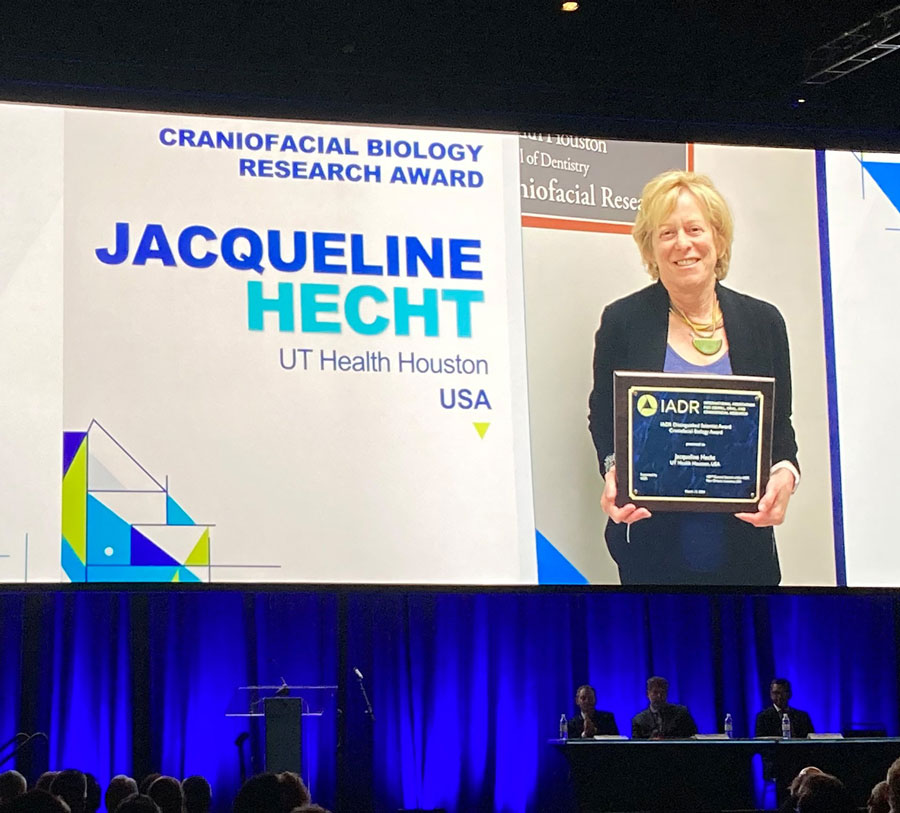Hecht receives 2024 IADR Distinguished Scientist Award

Jacqueline Hecht, PhD, professor in the Department of Pediatrics and the UTHealth Houston School of Dentistry, has been named the 2024 recipient of the Distinguished Scientist Award in Craniofacial Biology Research by the International Association for Dental, Oral, and Craniofacial Research.
Hecht was recognized at IADR’s 102nd General Session held March 13-16 in New Orleans.
The IADR Distinguished Scientist Award in Craniofacial Biology Research is bestowed annually to honor those who have contributed to the body of knowledge in craniofacial biology over a significant period of time. It recognizes the contributions to the scientific community throughout the awardee’s career, the impact of the research in the field, publications in refereed journals, funded research through the peer-reviewed mechanism, and other activities of a scholarly nature. The laurel is one of the 17 Distinguished Scientist Awards and is one of the highest honors bestowed by IADR.
Hecht is vice chair for research in the Department of Pediatrics and a distinguished teaching professor, and serves as the director of the Center for Craniofacial Research at the School of Dentistry. She completed her PhD in 1988 at UTHealth Houston School of Public Health.
She has extensive clinical expertise in common birth defects and gene discovery studies in complex birth defects, including nonsyndromic cleft lip and palate, nonsyndromic clubfoot, and single-gene disorders such as pseudoachondroplasia, a dwarfing condition.
“I am thrilled to be honored with this award,” said Hecht, the Leah L. Lewis Distinguished Chair. “When I first started collecting families and searching for the ‘cleft lip and palate genes,’ I thought there would only be a few genes, and they’d be easy to find. That was more than 30 years ago, and all the researchers working in the field have identified only 25 percent of the genetic variation underlying this common birth defect that affects one in 700 babies.
“Being recognized for this work by my colleagues and trainees means a lot to me. They have all contributed to a better understanding of the underlying molecular mechanisms, but we have a long way to go to find the remaining 75 percent.”
Hecht thanks the many individuals who’ve worked with her on ongoing projects, specifically Syed Hashmi, MD, MPH, PhD; Maria Elena Serna, and Rosa Martinez, who have managed the project.
She also recognizes that none of the research could be possible without the participants involved.
“We are indebted to the thousands of families that have participated in this study so that we could establish a large and well-characterized DNA database that will be used for current and future studies,” she said. “These families will allow us to test newly and future discovered genetic variants/mechanisms.”
This award marks the latest in Hecht’s illustrious research career. She has also been the recipient of the Barbara Bowman Distinguished Geneticist Award from the Texas Genetics Society in 2007, the REACH Research Award from the Multiple Hereditary Exostoses Research Foundation in 2011, The University of Texas System 2012 Regents’ Outstanding Teaching Award, UT Academy of Health Science Education in 2012, UTHealth Houston President’s Scholar Award in 2015, Distinguished Professional Woman Award in 2016, and Women Faculty Forum Excellence in Research Award in 2019.